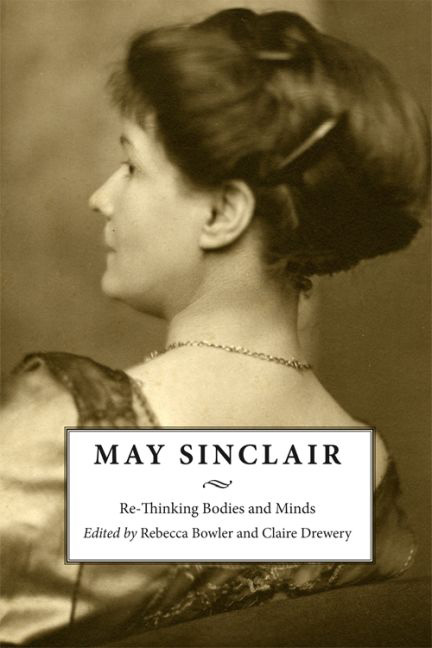Book contents
- Frontmatter
- Contents
- Acknowledgements
- Introduction: May Sinclair's Interdisciplinarity
- Part I The Abstract Intellect
- Part II Abject Bodies
- 6 Disembodying Desire: Ontological Fantasy, Libidinal Anxiety and the Erotics of Renunciation in May Sinclair
- 7 May Sinclair and Physical Culture: Fit Greeks and Flabby Victorians
- 8 Dolls and Dead Babies: Victorian Motherhood in May Sinclair's Life and Death of Harriett Frean
- 9 Why British Society Had to ‘Get a Young Virgin Sacrificed:’ Sacrificial Destiny in The Tree of Heaven
- 10 ‘Odd How the War Changes Us’: May Sinclair and Women's War Work
- 11 Transgressing Boundaries; Transcending Bodies: Sublimation and the Abject Corpus in Uncanny Stories and Tales Told by Simpson
- Notes on Contributors
- Index
9 - Why British Society Had to ‘Get a Young Virgin Sacrificed:’ Sacrificial Destiny in The Tree of Heaven
from Part II - Abject Bodies
Published online by Cambridge University Press: 26 May 2017
- Frontmatter
- Contents
- Acknowledgements
- Introduction: May Sinclair's Interdisciplinarity
- Part I The Abstract Intellect
- Part II Abject Bodies
- 6 Disembodying Desire: Ontological Fantasy, Libidinal Anxiety and the Erotics of Renunciation in May Sinclair
- 7 May Sinclair and Physical Culture: Fit Greeks and Flabby Victorians
- 8 Dolls and Dead Babies: Victorian Motherhood in May Sinclair's Life and Death of Harriett Frean
- 9 Why British Society Had to ‘Get a Young Virgin Sacrificed:’ Sacrificial Destiny in The Tree of Heaven
- 10 ‘Odd How the War Changes Us’: May Sinclair and Women's War Work
- 11 Transgressing Boundaries; Transcending Bodies: Sublimation and the Abject Corpus in Uncanny Stories and Tales Told by Simpson
- Notes on Contributors
- Index
Summary
Sacrifice is a key concept for May Sinclair, running through many of her fictional, philosophical and political works. The preoccupation with sacrifice in Sinclair's pre-war fiction is particularly noticeable with regard to female characters, and is often related to what was popularly known as the woman question: issues concerning women's role in and outside of the home. This chapter looks at a significant shift in Sinclair's attempts to use and understand sacrifice at the time of the war, and how it is represented in her writing.
Compared to her pre-war writing, Sinclair's conception of sacrifice became increasingly complex in the works composed during and after the First World War. A greater concern with the community on a national level is noticeable in her writings at this time. The Tree of Heaven (1917) combines the two issues and is for that reason of particular interest here. The novel primarily centres on the varying effects of war on the different members of the Harrison family, and in this focus, exemplifies Sinclair's increasing tendency to problematise the will of the community versus that of the individual, not only in the context of British society at war, but also within the project of first-wave feminism. In this chapter, I look at Sinclair's treatment of sacrifice in The Tree of Heaven as well as in a small selection of her works that precede its publication – Audrey Craven (1897), The Divine Fire (1904) and ‘The Flaw in the Crystal’ (1912) – to illustrate and evidence her conflicted stance towards sacrifice.
In an article written in 1912, ‘Defence of Men’, Sinclair reflects on the notion that women are forced to sacrifice more of themselves than men, and that women for that reason are nearer to spiritual concerns: ‘Spirituality, so difficult for [man] to come by, has been positively thrust upon woman. Born of her sacrificial destiny, it has been expected of her, nourished in her, guarded by all the sanctions of her life. She has had time for it, all the time of all the ages’ (Sinclair 1912a: 414). This shows that Sinclair had a distinct idea that women are sacrificed, or make sacrifices, on account of their sex, and furthermore that sacrifice is a crucial and unavoidable element of a woman's spirituality; it is her ‘destiny.’
- Type
- Chapter
- Information
- May SinclairRe-Thinking Bodies and Minds, pp. 177 - 193Publisher: Edinburgh University PressPrint publication year: 2017



